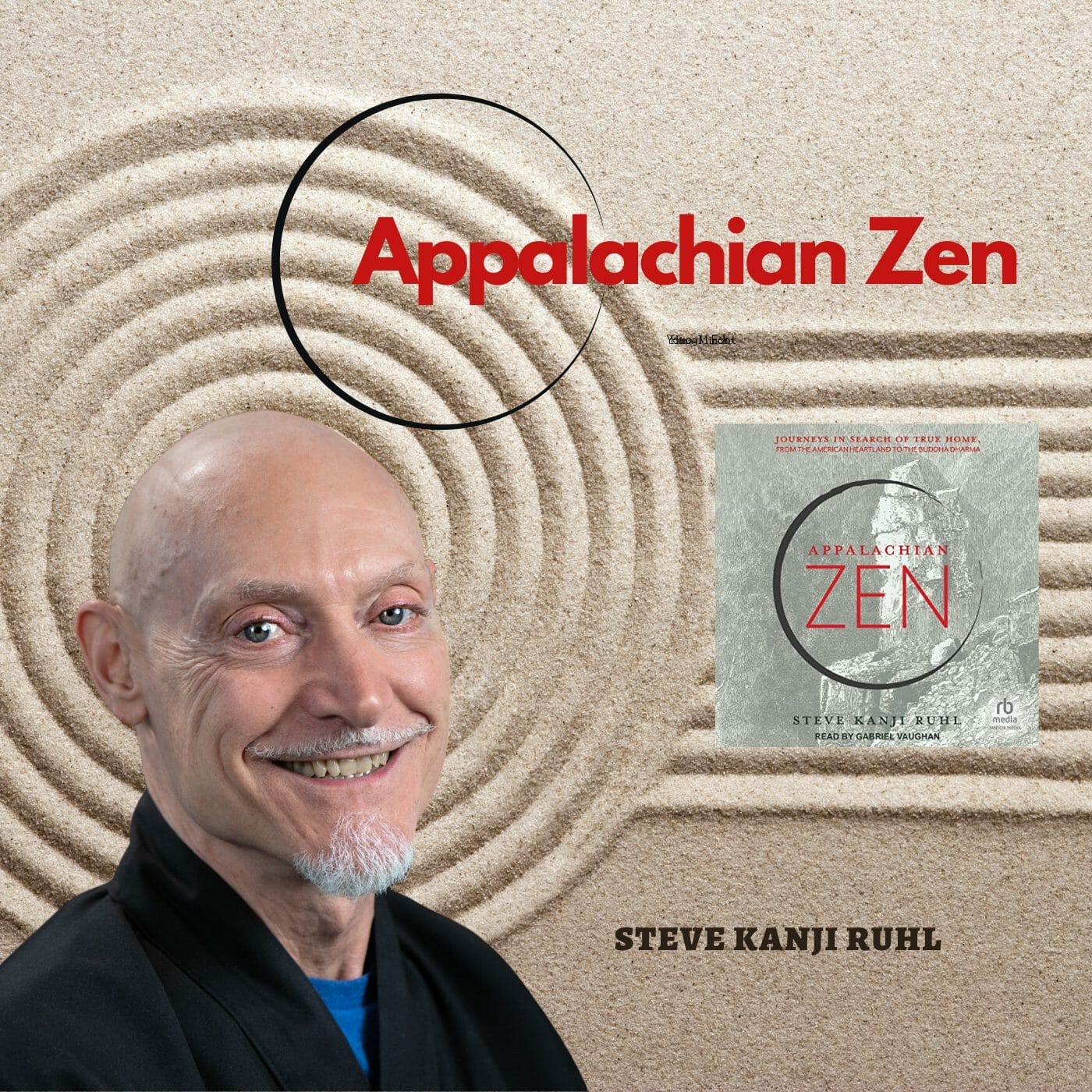Steve Kanji Ruhl: Appalachian Zen

In Appalachian Zen, Steve Kanji Ruhl describes a journey we all take, one that Buddhism calls “seeking our true home.” Edgy, lyrical, and lovingly rendered, Appalachian Zen tells how a kid from Pennsylvania mill towns, trailer parks, and backwoods farms grows up amid grief, rancor, and a passionate yearning to become something improbable: a teacher of Zen Buddhism.
An Interview with Steve Kanji Ruhl: Appalachian Zen
It invites readers to an adventure of discovery, roving from the Appalachian Mountains of central Pennsylvania to a footloose Zen pilgrimage in Japan and beyond. Featuring vivid firsthand accounts of spiritual seeking and teaching in Japanese temples, in forays to Tokyo and Hiroshima, in alleys of Kyoto, in Amish cornfields near the Susquehanna or a monastery in the Catskills, it includes robust historical sketches, rapt nature passages, and cultural references from Proust to punk rock.
Appalachian Zen engages the Buddhist theme of the death of the self by confronting suicides and the deaths of loved ones. Throughout, it engages the Buddhist theme of awakening.
OMTIMES: Appalachian Zen is getting strong reviews: “Brilliant and lyrical’ (Lion’s Roar); “A powerful synthesis of American Zen philosophy and cultural analysis” (Publisher’s Weekly); “Captivating” (Library Journal); “A stirring religious memoir” (Foreword Reviews); “exceedingly intelligent and full of lucid insights” (Kirkus Reviews). What are readers responding to? What makes Appalachian Zen unique?
Steve Kanji Ruhl: I think readers are responding to the universality of a spiritual journey experienced in all faith traditions: the search for a true home. We finally discover, through arduous seeking, that our true home is both inside us and everywhere.
But I think Appalachian Zen also is unique in its description of finding a Buddhist “Middle Way” that’s required for living between two very different worlds — my working-class background in central Appalachia in Pennsylvania and my academic background of study and teaching in America’s most elite educational institutions, including Deerfield Academy and Harvard and Yale. There’s also the balancing act of living as a Zen Buddhist minister in a non-Buddhist society.
So, there’s the spiritual journey. And, too this memoir depicts working-class life in rural America during the Eisenhower-to-Trump years. But, again, it’s a topic many people know little about. That’s because people from my background generally don’t write books — we don’t have access, and we’re too beaten down and exhausted by the daily struggles of surviving.
OMTIMES: The stereotype of American Buddhism is that it’s mostly a pursuit of upper-middle-class and economically privileged people. Is Appalachian Zen meant to challenge that stereotype?
Steve Kanji Ruhl: Yes, very much so.
OMTIMES: There’s also a rawness and authenticity in Appalachian Zen.
Steve Kanji Ruhl: I didn’t want to write one of those spiritual memoirs in which an author adopts a pose of holiness and purity to impress people. Instead, Appalachian Zen deals intimately with losses through suicide, anger, pain, hardship, violence, travel in Japan, and rapture in nature, love, and spiritual growth. It’s real. I think people are responding to that.
OMTIMES: Those themes are addressed from a Buddhist perspective. What is the primary spiritual lesson of Appalachian Zen?
Steve Kanji Ruhl: Forgiveness. Coming to realize, with an open heart, that people who hurt you are deeply hurt themselves. And being able, therefore, to forgive and to heal. Not from a dualistic place of “I forgive you,” but from Oneness, from no separation. From realizing that we’re all suffering, all of us, and have all caused harm, including me. This is the path of true liberation.
OMTIMES: What was the process of writing this spiritual memoir?
Steve Kanji Ruhl: It took me thirty years off and on because I also had to work full-time jobs to support myself. But the writing came as it always does, as a gift from a mysterious Source. My commitment was to be open and to receive it with gratitude.
OMTIMES: What is your biggest hope for Appalachian Zen?
Steve Kanji Ruhl: I hope it will inspire people to reflect on their own lives. And to find their path to their own true home.
Click HERE to Connect with your Daily Horoscope on OMTimes!
Visit Our Astrology Store for Personalized Reports
About The Author
 Steve Kanji Ruhl, an ordained Zen Buddhist minister, is the author of Enlightened Contemporaries and two volumes of poems, The Constant Yes of Things and Paintings of Rice Cakes Satisfy Hunger. He received his Master of Divinity degree from Harvard University and has been a speaker at Harvard. Center for World Religions, Yale Divinity School, the Omega Institute, and elsewhere. A Buddhist adviser at Yale University, he teaches through his Touch the Earth cyber-sangha. He lives in Leverett, Massachusetts.
Steve Kanji Ruhl, an ordained Zen Buddhist minister, is the author of Enlightened Contemporaries and two volumes of poems, The Constant Yes of Things and Paintings of Rice Cakes Satisfy Hunger. He received his Master of Divinity degree from Harvard University and has been a speaker at Harvard. Center for World Religions, Yale Divinity School, the Omega Institute, and elsewhere. A Buddhist adviser at Yale University, he teaches through his Touch the Earth cyber-sangha. He lives in Leverett, Massachusetts.
OMTimes is the premier Spiritually Conscious Magazine. Follow Us On Facebook, Twitter, Instagram, Linkedin, Pinterest, and Youtube
OMTimes Magazine is one of the leading on-line content providers of positivity, wellness and personal empowerment. OMTimes Magazine - Co-Creating a More Conscious Reality







